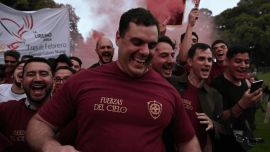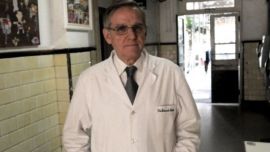While anti-communist police forces and dictatorship are familiar in Argentine history, the latest Korean Film Festival opened with a film about life under a different military regime this week.
In its Thursday night premiere at the Cinemark Palermo, the sixth installment of Han Cine festival was launched with Jang Joon-hwan’s 1987, a character-drenched chronology of the events leading up to the fall of the South Korean military dictatorship.
The festival, which runs from through September 19-25, is organised through the South Korean Embassy and the Korean Cultural Centre in Argentina. Films showing at this year’s festival grapple with topics stretching from human rights, military occupation and organised crime, to Korea’s history with the International Monetary Fund.
Moonhaeng Cho, Cultural Attache for the South Korean Embassy in Argentina and director of the Korean Cultural Centre, told the audience that Korean cinema holds esteem in the world, not only for its amount of film production, but for its quality.
“This year holds something special for the history of Korea… as October is the 100th anniversary of Korean cinema,” Cho said.
Directed by Jang Jooh-hwan, 1987 depicts the murder of student activist Park Jong-chul at the hands of the South Korean anti-communist police. His death triggered a wave of pro-democracy protests known as the June Democracy Movement, which forced the military government to hold elections.
A powerful showing of Cold War cinema, the film dives beyond shallow, typical cinematic depictions of the era with spies and nuclear brinkmanship. It grapples with the reality of the Cold War in many countires, Argentina included, which marked a time of anti-communist military governments and wanton repression of democratic activists.
In scenes with the director of the secret police and his cronies, anti-communist paranoia boils into the script. Rank and file soldiers salute higher-ups and chant “eradicate communism.” Government officials snarl and declare their utmost mission to destroy “pinko commies.”
Yet the underside of this rage is a reality all too familiar to Argentina. Screams in the torture chambers. Kidnappings of suspected communists in broad daylight. Simulated drowning and electric shocks. In one striking scene, the director of the secret police strolls as it were another day at the office past a blindfolded woman being led through the torture chamber.
“We chose Jang Joon-hwan’s 1987 as the opening film because we consider it an extraordinarily powerful film, not only in terms of cinematography, but also in social terms,” said Federico Poore, communications director at the Korean Cultural Centre. “South Korea and Argentina were under military until not so long ago, and they both had to fight for democracy in the 1980s, so we expect the film to resonate with Argentine audiences.”
Other films showing at the film festival include Swing Kids, a 2018 movie directed by Kang Hyeong-cheol which follows the story of a tap dancer interned at a North Korean prisoner of war camp during the Korean War.
Another which hits close to home with an Argentine audience is Default. Directed by Choi Kook-hee, the 2018 film depicts South Korea’s 1997 financial crisis and subsequent bailout by the IMF.
At the price of 150 pesos, the festival has showings at the Cinemark theatres in Palermo and Caballito until Wednesday. Showtimes can be found on the Han Cine Facebook page.
























Comments